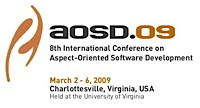Important dates
- Submissions due: January 7th, 2009 (extended)
- Author Notification: January 15th, 2009
- AOSD Early registration deadline: January 23rd, 2009
- Final version due: January 26th, 2009
- Workshop: Tuesday, March 3rd, 2009
Scope
Topics
We seek contributions related to domain-specific aspect languages, more particularly (but not limited to):
- design of DSALs and DSXs
- successful DSALs, DSXs and their applications
- issues in both design and implementation of DSALs and DSXs
- methodologies and tools suitable for creating DSALs and DSXs
- semantics and composition of DSALs and DSXs
- disciplined approaches for invasive metaprogramming
- error reporting in DSALs and debugging of DSALs
- approaches for composable language embeddings
- mechanisms for interaction detection and handling in DSALs
- theoretical foundations for DSALs
- analysis about the specificity spectrum in aspect languages
- key challenges for future work in the area
A good analysis of conflicting forces is at least as useful for potential participants of this workshop as descriptions of original new approaches or experience reports.
Submissions
The workshop accepts three types of submissions: work-in-progress papers, position papers, and technical papers.
Papers should be formatted in SIGPLAN proceedings style (sigplanconf.cls). Page limit is strict, and depends on the type of submission: 3 pages for work-in-progress and position papers, 5 pages for technical papers. Font size must be at least 9pt.
The submission should be sent in PDF format by email to jfabry @ dcc . uchile . cl clearly indicating the type of submission.
Format of the workshop
The format of the workshop will echo the format used in the previous editions:
A number of plenary sessions will first be held, according to grouping of accepted papers, consisting of (1) brief presentations of selected papers, (2) a discussion with the presenting authors including participation from the audience.
Second, interactive group work will be performed to identify relevant issues in the domain and possible ways to address them.
Publication
Program Committee
